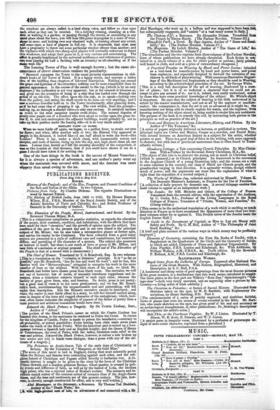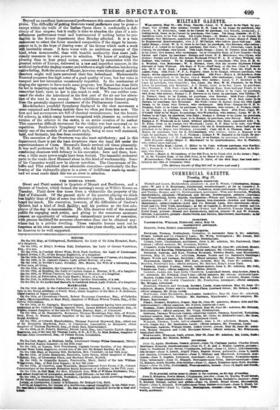MUSIC.
yirrn PHILHARMONIC CONCERT—MONDAT, MAY 18.
Sinfonia In C Minor, (No. 1) " Crudele, ah no into bone" Mendelssohn Bartholdy.
Reclt.
Aria, i " Non ml dir," Mademoiselle Rammeil, (Don 131ozart. Giovanni) Grand Bandeau Britian; Pianoforte. Mr. H. Plat
(Op. 56) Hummel. " Ecco 11 panto o vinous."
Recit. " Non pia dl Hort," Miss Bassano.—Como di mozart„ Arts, Habsetto obligate, Mr. Williams, (La cu- 1
menz • di Tito)
Overture, Euryanthe C. M. Von Web= PART 51.
SInfonla In B flat, (No. 4) Duette, "Il tenero affetto," Mademoiselle Rummell and Miss Bassano, (II Crociato in Egillo) Concertante Violin and Violoncello, Messrs. Deioffre and
Filet
Overture, Les Abencerages Conductor, Mr. Costa:
Beethoven. bieyerbeer.
Deleffro and Met. Cherubinl.
-Beyond an excellent inetrume,ntal performance this concert offers little to praise. The difficulty of getting first-rate vocal performers may be great- except within the walls of the Italian Opera there is confessedly a defi- ciency of fine singers; but it really is time to abandon the plan of a mis- cellaneous performance vocal and instrumental if nothing better be pro- ducible in the former department than Monday afforded. It is a vain endeavour to select the finest standard composition if the singer be incom- petent to it, in the hope of sharing some of the favour which sueh a work will inevitably create. It fares worse with an ambitions attempt of this kind, when unsuccessful, than with humble mediocrity that more judi- ciously measures its own powers in selection. We know of nothing less pleasing than to hear grand SCRIM, consecrated by snqncietion with the greatest artists of Europe, delivered in a raw and imperfect manner, in the artificial styleof the ainging-master, andwithout a single inflection betokening native feeling. Both the scenes of Mozart, however, were thus doomed ; and the dbectore might well have perceived their fate beforehand. Mademoiselle Rummel possesses fine high notes of a good quality of tone, but her voice is unequal and her intonation occasionally imperfect. In the mechanism of singing she appears to have made some progress; but Nature has done little for her in imparting taste and feeling. The voice of Miss Bassano is loud and somewhat hard; taste in her is also much to seek. We can neither com- mand the shake she introduced in the first part of the air nor her altera- tion of the text in the second. Such exhibitions as these detract greatly from the generally-improved character of the Philharmonic Concerts.
klendelssohn's youthful Symphony displayed in the slow movement a more sustained and flowing melody than we often get from him now. The first and last movements are full of classical reminiscences; but the beauti- ful scherzo, in which_ many hearers recognized with pleasure an orchestral version of the scherzo in the otetto, is an entire creation of its author. This somewhat difficult movement for the violins was best executed on its repetition. Beethoven's Symphony was exquisitely performed: it is cer- tainly one of the models of its author's style, being at once well sustained, bold, and fantastic, but free from eccentricity.
The execution of the Overtures was also most satisfactory; and in this department there is not the least decadence since the band fell under the superintendence of Costs. Hummers Rondo revived old times pleasantly. It was well performed by Mr. H. Field; who did full justice to the work in combining clearness with delicacy in his execution: here and there, how- ever, a little more power might have been desired. The beautiful orchestral parts to the rondo show Hummel alone in this kind of workmanship. Some of his Concertos would now be almost novelties. The Concertante of De- loffre and Pilet exhibited their admirable execution-particularly the fine bowing of the violoncello-player in a pieee of indiffereet made-up music: and we must needs think this too an error in selection.



























 Previous page
Previous page